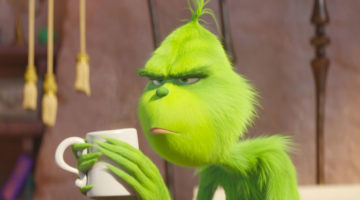Movie Review: The Woman In Black
Moving on from an iconic and much beloved film role takes skill, luck, and a heavily concerted effort between both the actor and the audience. Daniel Radcliffe, the young, charming, and optimistic Briton who has for so long been the vision of boy-wizardry, is attempting such hard-boring of slow boards.
It has been an ongoing process as he has been seen on stage in the psychological drama Equus, and singing and dancing in the musical, How to Succeed in Business Without Really Trying. It continues now with a new genre added to the resume: horror. Helping to revitalize the British company Hammer, one that was long synonymous with horror, with a long-adored novel and play, Mr. Radcliffe returns to the screen for the first time since, well, those movies that need no mention from which he is trying to escape.
 Daniel Radcliffe stars as ‘Arthur Kipps’ in THE WOMAN IN BLACK. Courtesy of Alliance Films
Daniel Radcliffe stars as ‘Arthur Kipps’ in THE WOMAN IN BLACK. Courtesy of Alliance Films
The Woman in Black¸ a naturally dark, particularly British, and especially scary film about a monomaniacal specter seeking revenge, demands of Radcliffe emotions and situations he has mostly yet to explore.
Portraying Arthur Kipps, a young, grieving father attempting to reassert himself as a valued worker at a law firm, Radcliffe bids a brief farewell to his motherless-son in the opening, and sets off to manage the paperwork of a recently deceased woman.
Kipps is taken to a small village made up of watchful children and laconic men, or quickly shutting doors and closing curtains. He is unwelcome, and yet knows not why, but he is consistently deterred from tending to the mess of a house left behind from the recently dead, a mansion that itself is a literally an island. A lone, lengthy, dirt road leads up to the foreboding Victorian, a path that daily is overtaken by tide, trapping those in the house.
The time spent in the house is exceedingly eerie; there is an apparition about, the titular woman in black, but what she wants is uncertain. She has no problem, however, making her presence known, albeit brief, in dramatic and loud fashion. As Kipps returns to the village, it would seem that the presence of the woman herself is what the true problem for everyone.
In one beautifully long scene in the middle of the film, with no words spoken and no end in sight, Kips wanders the house in search of the presence that he continuously either sees or hears. Radcliffe is exceptionally believable in both his curiosity and fear as he roams and run about a house from which he cannot escape.
Ordinary horror tropes are executed to perfection, with even anticipated scares exceeding frightened expectations. The many children in the movie all possess within themselves a naivete yet surety that is especially creepy. In one moment child-like, and the next seemingly possessed, the many youths in the film-alive and dead-offer the first scares of the movie, and many more to follow.
Director James Watkins adds in his own clever creepy devices, and if Radcliffe is the biggest star of the film, then the next iconic participant is the ominous collection of the most terrifying dolls and puppets, apparently made for children, that occupy the deathly home.
As Radcliffe moves beyond his famed wizard role, he finds success in first horror adventure, though it is uncertain whether the audience cares more for the success and happiness of Kipps, or that of Mr. Radcliffe himself. There is a lasting and endearing connection made between Kipps and his son, if only because of the earnestness of the boy, but a far less strong one made with Kipps and his wife, who is occasionally seen in flashbacks.
His character comes off as human and sympathetic, though that is more a testament to the abilities of Mr. Radcliffe than the development of Kipps. Genre fans will notice the British feel to the movie, as well as devices used in Spanish and Japanese horror to greatness, but also a bit of North American influence that is less welcome.
The ending may prove divisive, as often happens with many horror films, but it is clear that Mr. Radcliffe will continue to excel at his every endeavor, wizard or otherwise.
[star v=35]





